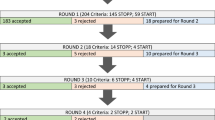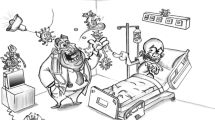Abstract
Background: Adverse drug reactions (ADRs) cause significant morbidity and mortality and account for around 6.5% of hospital admissions. Patient experiences of serious ADRs and their long-term impact on patients’ lives, including their influence on current attitudes towards medicines, have not been previously explored.
Objective: The aim of the study was to explore the experiences, beliefs, and attitudes of survivors of serious ADRs, using drug-induced Stevens-Johnson syndrome (SJS) and Toxic Epidermal Necrolysis (TEN) as a paradigm.
Methods: A retrospective, qualitative study was undertaken using detailed semi-structured interviews. Fourteen adult survivors of SJS and TEN, admitted to two teaching hospitals in the UK, one the location of a tertiary burns centre, were interviewed. Interview transcripts were independently analysed by three different researchers and themes emerging from the text identified.
Results: All 14 patients were aware that their condition was drug induced, and all but one knew the specific drug(s) implicated. Several expressed surprise at the perceived lack of awareness of the ADR amongst healthcare professionals, and described how the ADR was mistaken for another condition.
Survivors believed that causes of the ADR included (i) being given too high a dose of the drug; (ii) medical staff ignoring existing allergies; and (iii) failure to monitor blood tests. Only two believed that the reaction was unavoidable. Those who believed that the condition could have been avoided had less trust in healthcare professionals. The ADR had a persisting impact on their current lives physically and psychologically. Many now avoided medicines altogether and were fearful of becoming ill enough to need them.
Conclusions: Life-threatening ADRs continued to affect patients’ lives long after the event. Patients’ beliefs regarding the cause of the ADR differed, and may have influenced their trust in healthcare professionals and medicines. We propose that clear communication during the acute phase of a serious ADR may therefore be important.

Similar content being viewed by others
References
Pirmohamed M, James S, Meakin S, et al. Adverse drug reactions a cause for admission to hospital: prospective analysis of 18,820 patients. BMJ 2004; 329: 15–9
French LE. Toxic epidermal necrolysis and Stevens Johnson syndrome: our current understanding. Allergol Int 2006; 55: 9–16
Bastuji-Garin S, Rzany B, Stern RS, et al. Clinical classification of cases of toxic epidermal necrolysis, Stevens-Johnson syndrome, and erythema multiforme. Arch Dermatol 1993; 129(1): 92–6
Roujeau JC, Kelly JP, Naldi L, et al. Medication use and the risk of Stevens-Johnson syndrome or toxic epidermal necrolysis. N Engl J Med 1995; 333(24): 1600–7
Roujeau JC, Stern RS. Severe cutaneous adverse reactions to drugs. N Engl J Med 1994; 331: 1272–85
Strauss A, Corbin J. Basics of qualitative research. 2nd ed. London: Sage Publications, 1998
Chung WH, Hung SL, Hong HS, et al. Medical genetics: a marker for Stevens-Johnson syndrome. Nature 2004; 428: 486
Chave TA, Mortimer NJ, Sladden MJ, et al. Toxic epidermal necrolysis: current evidence, practical management, and future directions. Br J Dermatol 2005; 153: 241–5
Kelemen JJ, Cioffi WG, McManus WF, et al. Burn center care for patients with toxic epidermal necrolysis. J Am Coll Surg 1995; 80: 273–8
Patterson DR, Carrigan L, Questad KA, et al. Post-traumatic stress disorder in hospitalized patients with burns injuries. J Burn Care Rehabil 1990; 11(3): 181–4
Cuthbertson BH, Hull A, Strachan M, et al. Post traumatic stress disorder after critical illness requiring general intensive care. Intensive Care Med 2004; 30(3): 450–5
Ziebland S, Chapple A, Dumelow C, et al. How the internet affects patients’ experience of cancer: a qualitative study. BMJ 2004; 328: 564
Davison KP, Pennebaker JW, Dickerson SS. Who talks? The social psychology of illness support groups. Am Psychol 2000; 55(2): 205–17
Acknowledgements
We thank Dr Jonathan Ives, Research Fellow at the Centre for the Study of Global Ethics at the University of Birmingham, for reviewing the research protocol and ethical aspects of the study, Professor Jan Oyebode and Dr Michael Larkin from the Department of Psychology at the University of Birmingham for reviewing the manuscript, and all our interviewees for giving up their time for this study.
This study was supported by the University of Birmingham. Robin Ferner has occasionally provided expert testimony on adverse drug reactions, including Stevens-Johnson Syndrome. The other authors have no conflicts of interest to declare.
The study was approved by the West Midlands Research Ethics Committee. Each participant gave written informed consent prior to participating in the study.
Author information
Authors and Affiliations
Corresponding author
Electronic supplementary material
Rights and permissions
About this article
Cite this article
Butt, T.F., Cox, A.R., Lewis, H. et al. Patient Experiences of Serious Adverse Drug Reactions and Their Attitudes to Medicines. Drug-Safety 34, 319–328 (2011). https://doi.org/10.2165/11588460-000000000-00000
Published:
Issue Date:
DOI: https://doi.org/10.2165/11588460-000000000-00000




